Analyzing the Evolution of Fandom and its Effects on Celebrities
VerifiedAdded on 2023/04/23
|9
|2828
|179
Essay
AI Summary
This essay delves into the evolution of fandom and its multifaceted effects on celebrities, examining its historical roots, the formation of fan communities, and the impact of participatory culture. It explores both the positive and negative aspects of fandom, including the psychological benefits for fans and the potential for obsessive behavior. A case study of Blackpink highlights issues of racism within fandom and the role of fans in defending their idols. The essay also discusses how fandom influences celebrities' public image, behavior, and social responsibilities, concluding that fandom is a complex phenomenon with significant social and cultural implications.
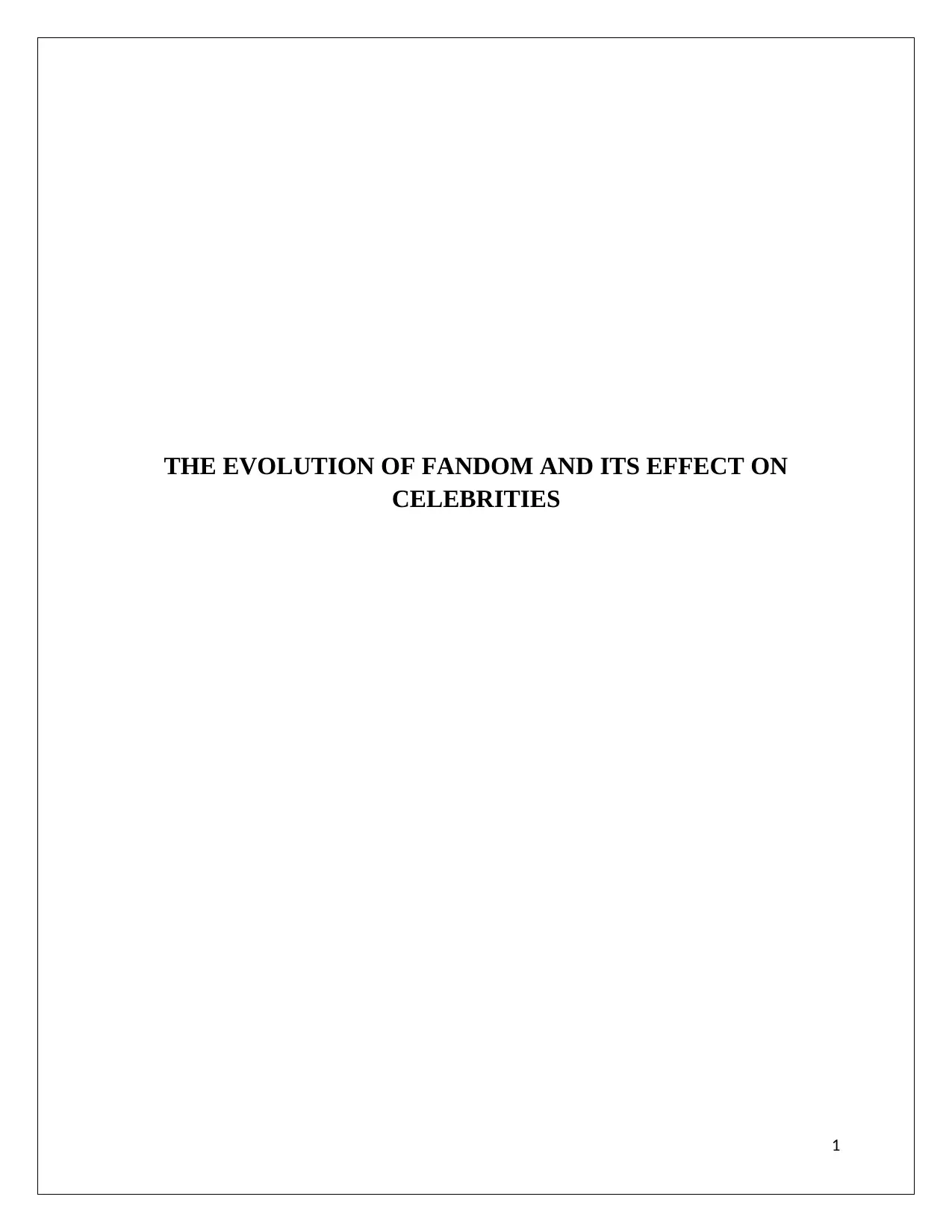
THE EVOLUTION OF FANDOM AND ITS EFFECT ON
CELEBRITIES
1
CELEBRITIES
1
Paraphrase This Document
Need a fresh take? Get an instant paraphrase of this document with our AI Paraphraser

Table of Contents
Introduction......................................................................................................................................2
What is fandom?..............................................................................................................................2
History and evolution......................................................................................................................2
Fandom: Black, white or gray?........................................................................................................3
Blackpink fans and racism...............................................................................................................4
Effect of fandom on celebrities........................................................................................................5
Conclusion.......................................................................................................................................6
Reference list...................................................................................................................................7
2
Introduction......................................................................................................................................2
What is fandom?..............................................................................................................................2
History and evolution......................................................................................................................2
Fandom: Black, white or gray?........................................................................................................3
Blackpink fans and racism...............................................................................................................4
Effect of fandom on celebrities........................................................................................................5
Conclusion.......................................................................................................................................6
Reference list...................................................................................................................................7
2
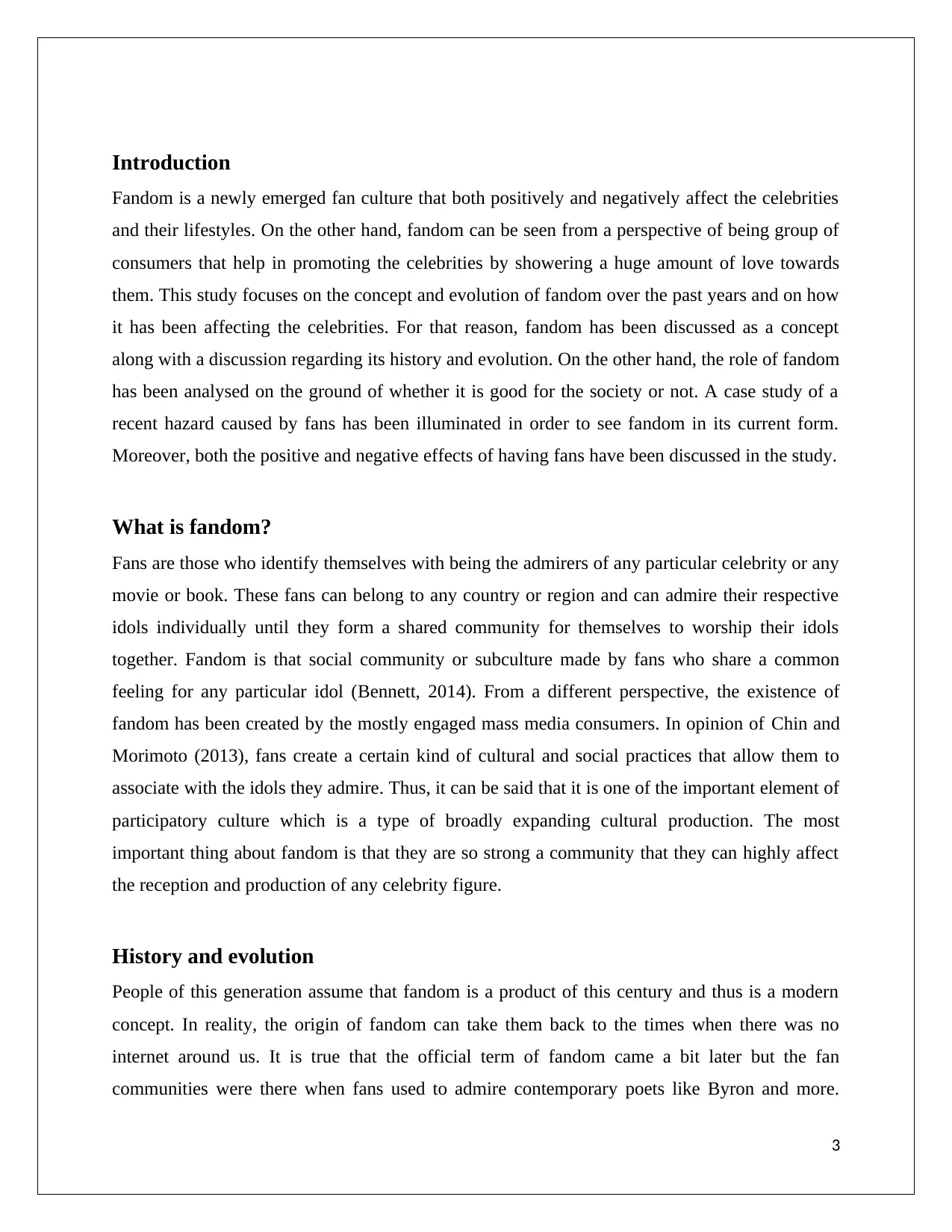
Introduction
Fandom is a newly emerged fan culture that both positively and negatively affect the celebrities
and their lifestyles. On the other hand, fandom can be seen from a perspective of being group of
consumers that help in promoting the celebrities by showering a huge amount of love towards
them. This study focuses on the concept and evolution of fandom over the past years and on how
it has been affecting the celebrities. For that reason, fandom has been discussed as a concept
along with a discussion regarding its history and evolution. On the other hand, the role of fandom
has been analysed on the ground of whether it is good for the society or not. A case study of a
recent hazard caused by fans has been illuminated in order to see fandom in its current form.
Moreover, both the positive and negative effects of having fans have been discussed in the study.
What is fandom?
Fans are those who identify themselves with being the admirers of any particular celebrity or any
movie or book. These fans can belong to any country or region and can admire their respective
idols individually until they form a shared community for themselves to worship their idols
together. Fandom is that social community or subculture made by fans who share a common
feeling for any particular idol (Bennett, 2014). From a different perspective, the existence of
fandom has been created by the mostly engaged mass media consumers. In opinion of Chin and
Morimoto (2013), fans create a certain kind of cultural and social practices that allow them to
associate with the idols they admire. Thus, it can be said that it is one of the important element of
participatory culture which is a type of broadly expanding cultural production. The most
important thing about fandom is that they are so strong a community that they can highly affect
the reception and production of any celebrity figure.
History and evolution
People of this generation assume that fandom is a product of this century and thus is a modern
concept. In reality, the origin of fandom can take them back to the times when there was no
internet around us. It is true that the official term of fandom came a bit later but the fan
communities were there when fans used to admire contemporary poets like Byron and more.
3
Fandom is a newly emerged fan culture that both positively and negatively affect the celebrities
and their lifestyles. On the other hand, fandom can be seen from a perspective of being group of
consumers that help in promoting the celebrities by showering a huge amount of love towards
them. This study focuses on the concept and evolution of fandom over the past years and on how
it has been affecting the celebrities. For that reason, fandom has been discussed as a concept
along with a discussion regarding its history and evolution. On the other hand, the role of fandom
has been analysed on the ground of whether it is good for the society or not. A case study of a
recent hazard caused by fans has been illuminated in order to see fandom in its current form.
Moreover, both the positive and negative effects of having fans have been discussed in the study.
What is fandom?
Fans are those who identify themselves with being the admirers of any particular celebrity or any
movie or book. These fans can belong to any country or region and can admire their respective
idols individually until they form a shared community for themselves to worship their idols
together. Fandom is that social community or subculture made by fans who share a common
feeling for any particular idol (Bennett, 2014). From a different perspective, the existence of
fandom has been created by the mostly engaged mass media consumers. In opinion of Chin and
Morimoto (2013), fans create a certain kind of cultural and social practices that allow them to
associate with the idols they admire. Thus, it can be said that it is one of the important element of
participatory culture which is a type of broadly expanding cultural production. The most
important thing about fandom is that they are so strong a community that they can highly affect
the reception and production of any celebrity figure.
History and evolution
People of this generation assume that fandom is a product of this century and thus is a modern
concept. In reality, the origin of fandom can take them back to the times when there was no
internet around us. It is true that the official term of fandom came a bit later but the fan
communities were there when fans used to admire contemporary poets like Byron and more.
3
⊘ This is a preview!⊘
Do you want full access?
Subscribe today to unlock all pages.

Trusted by 1+ million students worldwide
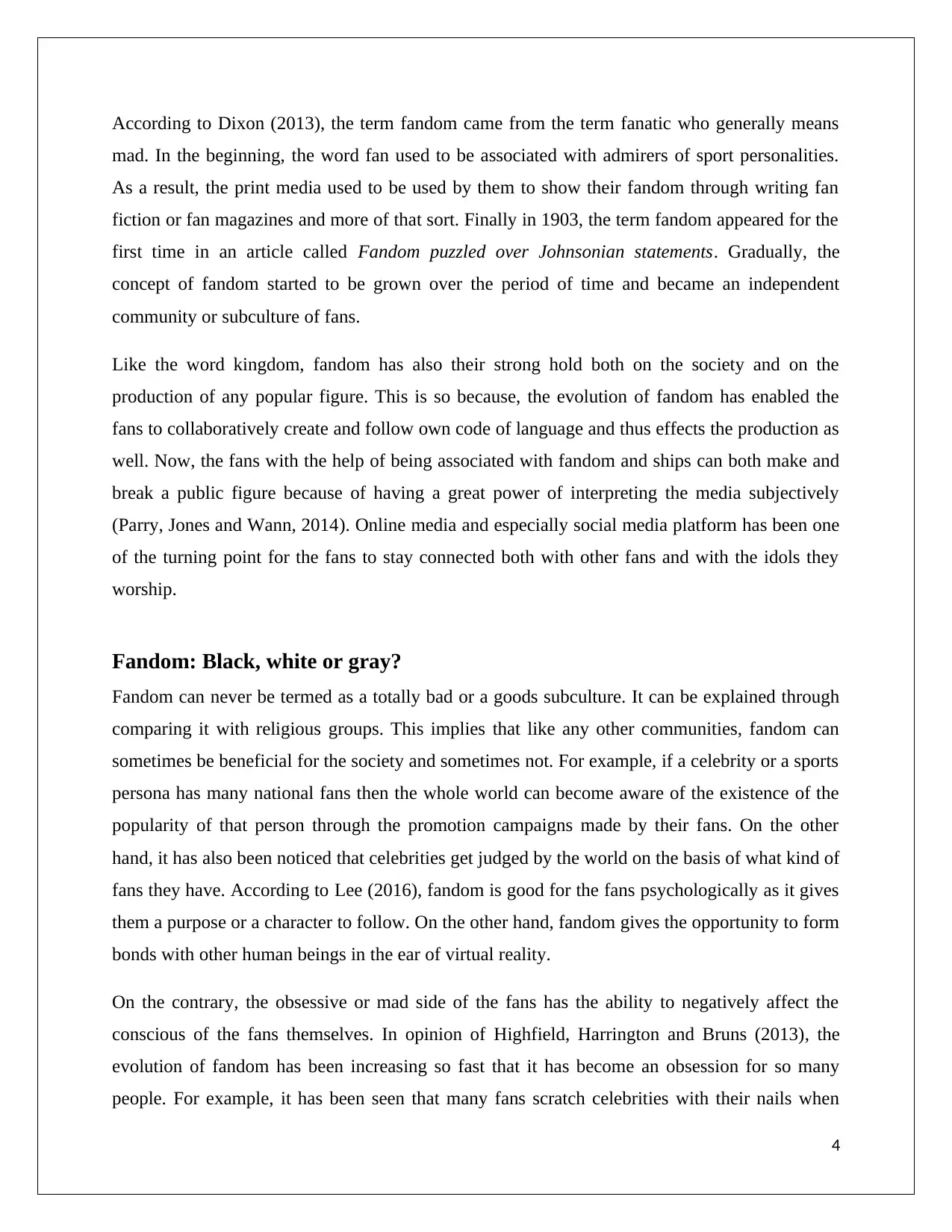
According to Dixon (2013), the term fandom came from the term fanatic who generally means
mad. In the beginning, the word fan used to be associated with admirers of sport personalities.
As a result, the print media used to be used by them to show their fandom through writing fan
fiction or fan magazines and more of that sort. Finally in 1903, the term fandom appeared for the
first time in an article called Fandom puzzled over Johnsonian statements. Gradually, the
concept of fandom started to be grown over the period of time and became an independent
community or subculture of fans.
Like the word kingdom, fandom has also their strong hold both on the society and on the
production of any popular figure. This is so because, the evolution of fandom has enabled the
fans to collaboratively create and follow own code of language and thus effects the production as
well. Now, the fans with the help of being associated with fandom and ships can both make and
break a public figure because of having a great power of interpreting the media subjectively
(Parry, Jones and Wann, 2014). Online media and especially social media platform has been one
of the turning point for the fans to stay connected both with other fans and with the idols they
worship.
Fandom: Black, white or gray?
Fandom can never be termed as a totally bad or a goods subculture. It can be explained through
comparing it with religious groups. This implies that like any other communities, fandom can
sometimes be beneficial for the society and sometimes not. For example, if a celebrity or a sports
persona has many national fans then the whole world can become aware of the existence of the
popularity of that person through the promotion campaigns made by their fans. On the other
hand, it has also been noticed that celebrities get judged by the world on the basis of what kind of
fans they have. According to Lee (2016), fandom is good for the fans psychologically as it gives
them a purpose or a character to follow. On the other hand, fandom gives the opportunity to form
bonds with other human beings in the ear of virtual reality.
On the contrary, the obsessive or mad side of the fans has the ability to negatively affect the
conscious of the fans themselves. In opinion of Highfield, Harrington and Bruns (2013), the
evolution of fandom has been increasing so fast that it has become an obsession for so many
people. For example, it has been seen that many fans scratch celebrities with their nails when
4
mad. In the beginning, the word fan used to be associated with admirers of sport personalities.
As a result, the print media used to be used by them to show their fandom through writing fan
fiction or fan magazines and more of that sort. Finally in 1903, the term fandom appeared for the
first time in an article called Fandom puzzled over Johnsonian statements. Gradually, the
concept of fandom started to be grown over the period of time and became an independent
community or subculture of fans.
Like the word kingdom, fandom has also their strong hold both on the society and on the
production of any popular figure. This is so because, the evolution of fandom has enabled the
fans to collaboratively create and follow own code of language and thus effects the production as
well. Now, the fans with the help of being associated with fandom and ships can both make and
break a public figure because of having a great power of interpreting the media subjectively
(Parry, Jones and Wann, 2014). Online media and especially social media platform has been one
of the turning point for the fans to stay connected both with other fans and with the idols they
worship.
Fandom: Black, white or gray?
Fandom can never be termed as a totally bad or a goods subculture. It can be explained through
comparing it with religious groups. This implies that like any other communities, fandom can
sometimes be beneficial for the society and sometimes not. For example, if a celebrity or a sports
persona has many national fans then the whole world can become aware of the existence of the
popularity of that person through the promotion campaigns made by their fans. On the other
hand, it has also been noticed that celebrities get judged by the world on the basis of what kind of
fans they have. According to Lee (2016), fandom is good for the fans psychologically as it gives
them a purpose or a character to follow. On the other hand, fandom gives the opportunity to form
bonds with other human beings in the ear of virtual reality.
On the contrary, the obsessive or mad side of the fans has the ability to negatively affect the
conscious of the fans themselves. In opinion of Highfield, Harrington and Bruns (2013), the
evolution of fandom has been increasing so fast that it has become an obsession for so many
people. For example, it has been seen that many fans scratch celebrities with their nails when
4
Paraphrase This Document
Need a fresh take? Get an instant paraphrase of this document with our AI Paraphraser
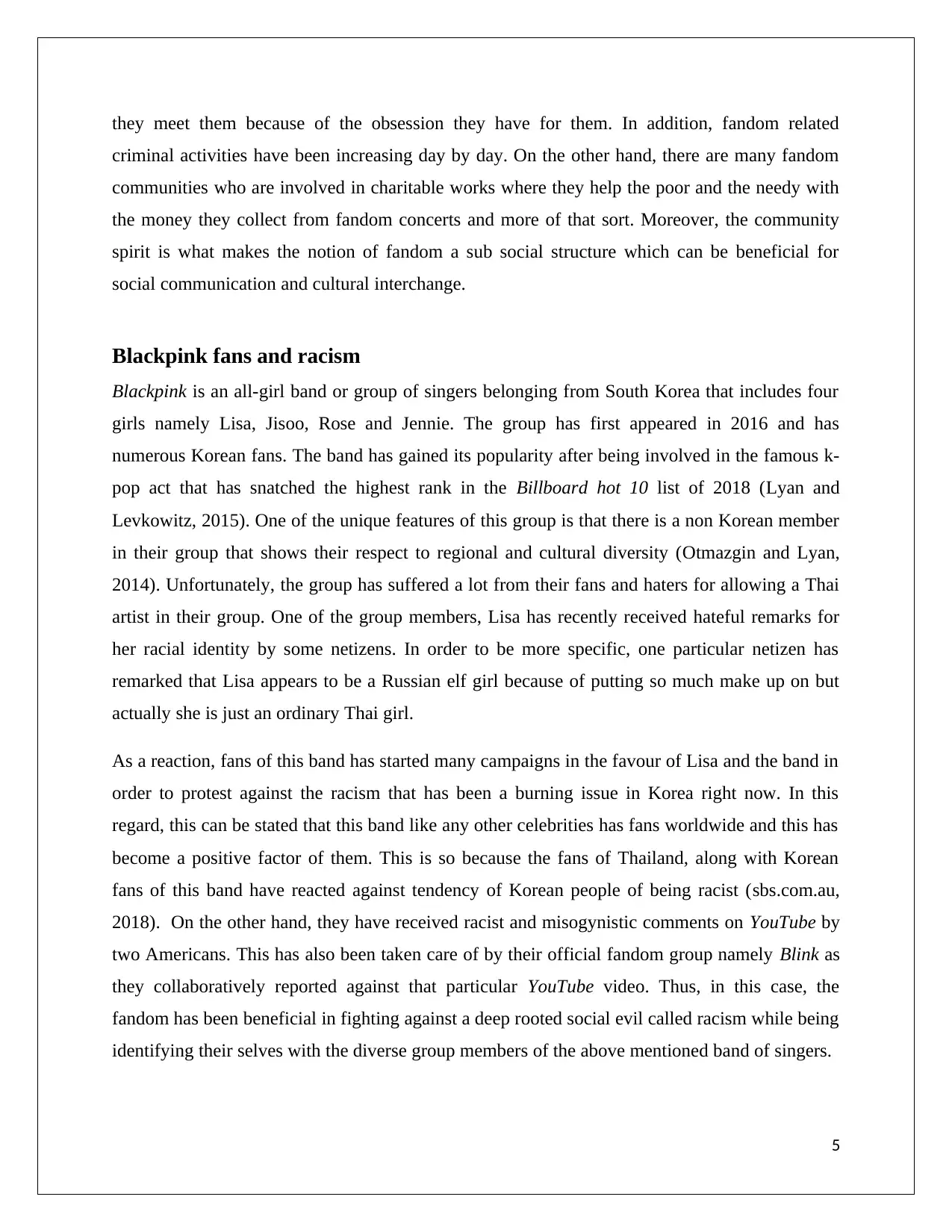
they meet them because of the obsession they have for them. In addition, fandom related
criminal activities have been increasing day by day. On the other hand, there are many fandom
communities who are involved in charitable works where they help the poor and the needy with
the money they collect from fandom concerts and more of that sort. Moreover, the community
spirit is what makes the notion of fandom a sub social structure which can be beneficial for
social communication and cultural interchange.
Blackpink fans and racism
Blackpink is an all-girl band or group of singers belonging from South Korea that includes four
girls namely Lisa, Jisoo, Rose and Jennie. The group has first appeared in 2016 and has
numerous Korean fans. The band has gained its popularity after being involved in the famous k-
pop act that has snatched the highest rank in the Billboard hot 10 list of 2018 (Lyan and
Levkowitz, 2015). One of the unique features of this group is that there is a non Korean member
in their group that shows their respect to regional and cultural diversity (Otmazgin and Lyan,
2014). Unfortunately, the group has suffered a lot from their fans and haters for allowing a Thai
artist in their group. One of the group members, Lisa has recently received hateful remarks for
her racial identity by some netizens. In order to be more specific, one particular netizen has
remarked that Lisa appears to be a Russian elf girl because of putting so much make up on but
actually she is just an ordinary Thai girl.
As a reaction, fans of this band has started many campaigns in the favour of Lisa and the band in
order to protest against the racism that has been a burning issue in Korea right now. In this
regard, this can be stated that this band like any other celebrities has fans worldwide and this has
become a positive factor of them. This is so because the fans of Thailand, along with Korean
fans of this band have reacted against tendency of Korean people of being racist (sbs.com.au,
2018). On the other hand, they have received racist and misogynistic comments on YouTube by
two Americans. This has also been taken care of by their official fandom group namely Blink as
they collaboratively reported against that particular YouTube video. Thus, in this case, the
fandom has been beneficial in fighting against a deep rooted social evil called racism while being
identifying their selves with the diverse group members of the above mentioned band of singers.
5
criminal activities have been increasing day by day. On the other hand, there are many fandom
communities who are involved in charitable works where they help the poor and the needy with
the money they collect from fandom concerts and more of that sort. Moreover, the community
spirit is what makes the notion of fandom a sub social structure which can be beneficial for
social communication and cultural interchange.
Blackpink fans and racism
Blackpink is an all-girl band or group of singers belonging from South Korea that includes four
girls namely Lisa, Jisoo, Rose and Jennie. The group has first appeared in 2016 and has
numerous Korean fans. The band has gained its popularity after being involved in the famous k-
pop act that has snatched the highest rank in the Billboard hot 10 list of 2018 (Lyan and
Levkowitz, 2015). One of the unique features of this group is that there is a non Korean member
in their group that shows their respect to regional and cultural diversity (Otmazgin and Lyan,
2014). Unfortunately, the group has suffered a lot from their fans and haters for allowing a Thai
artist in their group. One of the group members, Lisa has recently received hateful remarks for
her racial identity by some netizens. In order to be more specific, one particular netizen has
remarked that Lisa appears to be a Russian elf girl because of putting so much make up on but
actually she is just an ordinary Thai girl.
As a reaction, fans of this band has started many campaigns in the favour of Lisa and the band in
order to protest against the racism that has been a burning issue in Korea right now. In this
regard, this can be stated that this band like any other celebrities has fans worldwide and this has
become a positive factor of them. This is so because the fans of Thailand, along with Korean
fans of this band have reacted against tendency of Korean people of being racist (sbs.com.au,
2018). On the other hand, they have received racist and misogynistic comments on YouTube by
two Americans. This has also been taken care of by their official fandom group namely Blink as
they collaboratively reported against that particular YouTube video. Thus, in this case, the
fandom has been beneficial in fighting against a deep rooted social evil called racism while being
identifying their selves with the diverse group members of the above mentioned band of singers.
5
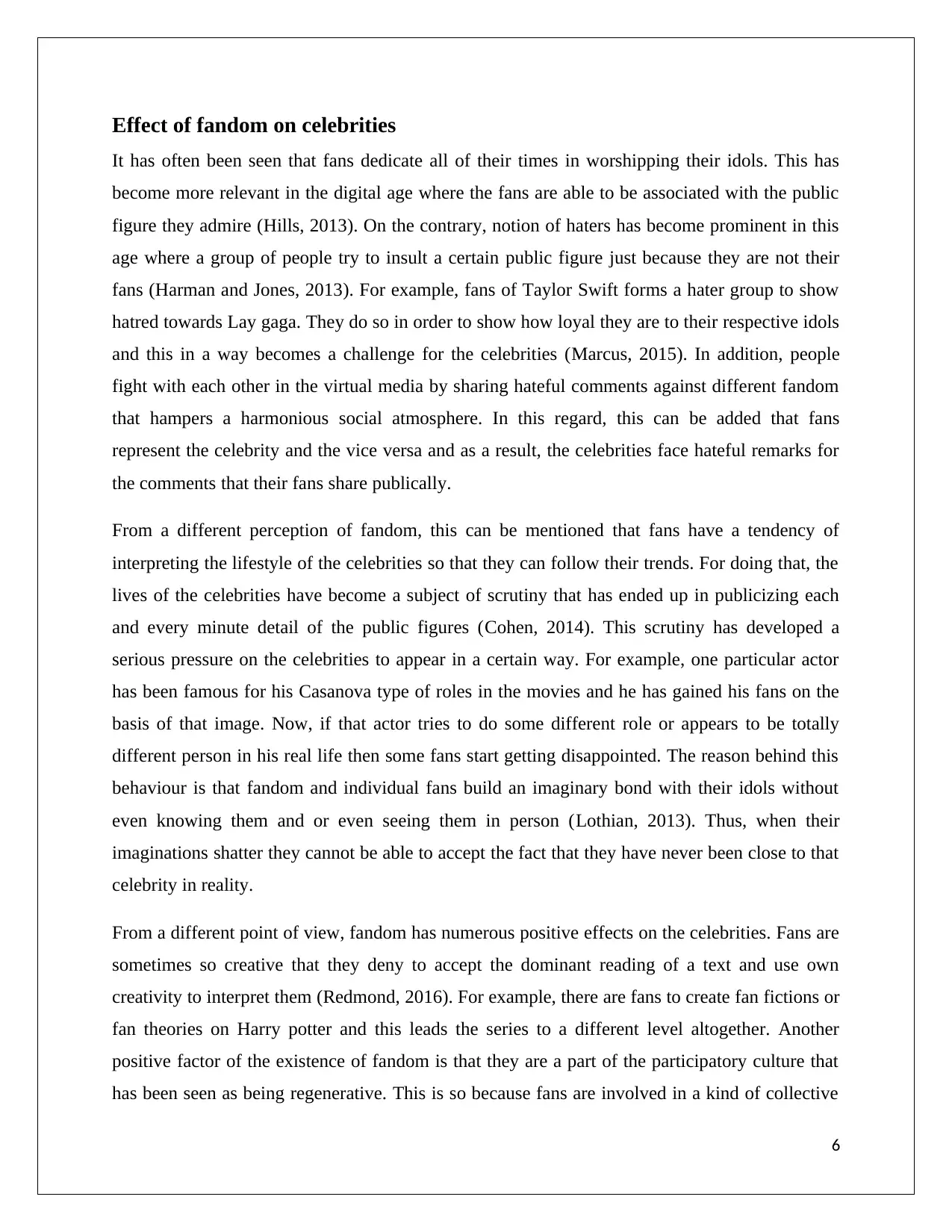
Effect of fandom on celebrities
It has often been seen that fans dedicate all of their times in worshipping their idols. This has
become more relevant in the digital age where the fans are able to be associated with the public
figure they admire (Hills, 2013). On the contrary, notion of haters has become prominent in this
age where a group of people try to insult a certain public figure just because they are not their
fans (Harman and Jones, 2013). For example, fans of Taylor Swift forms a hater group to show
hatred towards Lay gaga. They do so in order to show how loyal they are to their respective idols
and this in a way becomes a challenge for the celebrities (Marcus, 2015). In addition, people
fight with each other in the virtual media by sharing hateful comments against different fandom
that hampers a harmonious social atmosphere. In this regard, this can be added that fans
represent the celebrity and the vice versa and as a result, the celebrities face hateful remarks for
the comments that their fans share publically.
From a different perception of fandom, this can be mentioned that fans have a tendency of
interpreting the lifestyle of the celebrities so that they can follow their trends. For doing that, the
lives of the celebrities have become a subject of scrutiny that has ended up in publicizing each
and every minute detail of the public figures (Cohen, 2014). This scrutiny has developed a
serious pressure on the celebrities to appear in a certain way. For example, one particular actor
has been famous for his Casanova type of roles in the movies and he has gained his fans on the
basis of that image. Now, if that actor tries to do some different role or appears to be totally
different person in his real life then some fans start getting disappointed. The reason behind this
behaviour is that fandom and individual fans build an imaginary bond with their idols without
even knowing them and or even seeing them in person (Lothian, 2013). Thus, when their
imaginations shatter they cannot be able to accept the fact that they have never been close to that
celebrity in reality.
From a different point of view, fandom has numerous positive effects on the celebrities. Fans are
sometimes so creative that they deny to accept the dominant reading of a text and use own
creativity to interpret them (Redmond, 2016). For example, there are fans to create fan fictions or
fan theories on Harry potter and this leads the series to a different level altogether. Another
positive factor of the existence of fandom is that they are a part of the participatory culture that
has been seen as being regenerative. This is so because fans are involved in a kind of collective
6
It has often been seen that fans dedicate all of their times in worshipping their idols. This has
become more relevant in the digital age where the fans are able to be associated with the public
figure they admire (Hills, 2013). On the contrary, notion of haters has become prominent in this
age where a group of people try to insult a certain public figure just because they are not their
fans (Harman and Jones, 2013). For example, fans of Taylor Swift forms a hater group to show
hatred towards Lay gaga. They do so in order to show how loyal they are to their respective idols
and this in a way becomes a challenge for the celebrities (Marcus, 2015). In addition, people
fight with each other in the virtual media by sharing hateful comments against different fandom
that hampers a harmonious social atmosphere. In this regard, this can be added that fans
represent the celebrity and the vice versa and as a result, the celebrities face hateful remarks for
the comments that their fans share publically.
From a different perception of fandom, this can be mentioned that fans have a tendency of
interpreting the lifestyle of the celebrities so that they can follow their trends. For doing that, the
lives of the celebrities have become a subject of scrutiny that has ended up in publicizing each
and every minute detail of the public figures (Cohen, 2014). This scrutiny has developed a
serious pressure on the celebrities to appear in a certain way. For example, one particular actor
has been famous for his Casanova type of roles in the movies and he has gained his fans on the
basis of that image. Now, if that actor tries to do some different role or appears to be totally
different person in his real life then some fans start getting disappointed. The reason behind this
behaviour is that fandom and individual fans build an imaginary bond with their idols without
even knowing them and or even seeing them in person (Lothian, 2013). Thus, when their
imaginations shatter they cannot be able to accept the fact that they have never been close to that
celebrity in reality.
From a different point of view, fandom has numerous positive effects on the celebrities. Fans are
sometimes so creative that they deny to accept the dominant reading of a text and use own
creativity to interpret them (Redmond, 2016). For example, there are fans to create fan fictions or
fan theories on Harry potter and this leads the series to a different level altogether. Another
positive factor of the existence of fandom is that they are a part of the participatory culture that
has been seen as being regenerative. This is so because fans are involved in a kind of collective
6
⊘ This is a preview!⊘
Do you want full access?
Subscribe today to unlock all pages.

Trusted by 1+ million students worldwide
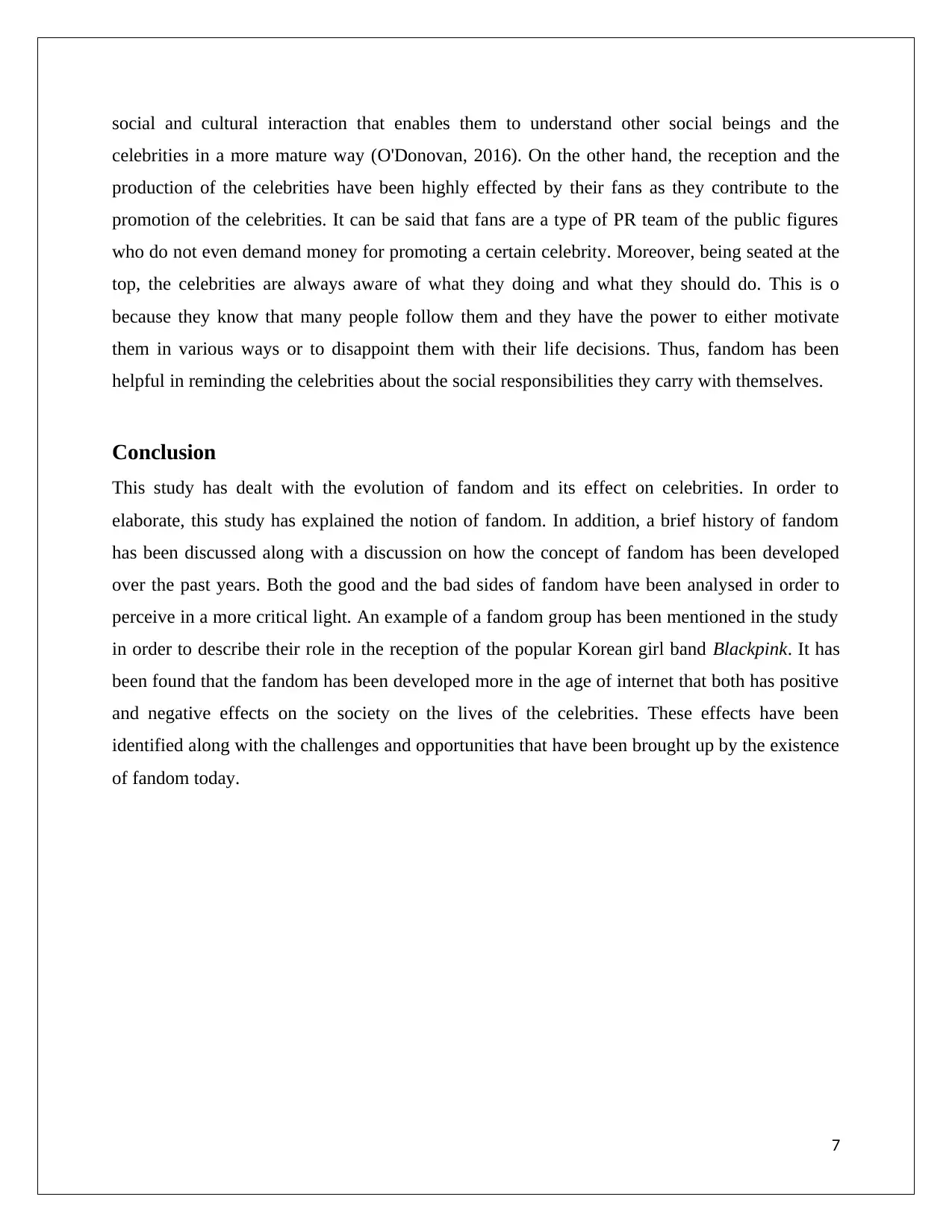
social and cultural interaction that enables them to understand other social beings and the
celebrities in a more mature way (O'Donovan, 2016). On the other hand, the reception and the
production of the celebrities have been highly effected by their fans as they contribute to the
promotion of the celebrities. It can be said that fans are a type of PR team of the public figures
who do not even demand money for promoting a certain celebrity. Moreover, being seated at the
top, the celebrities are always aware of what they doing and what they should do. This is o
because they know that many people follow them and they have the power to either motivate
them in various ways or to disappoint them with their life decisions. Thus, fandom has been
helpful in reminding the celebrities about the social responsibilities they carry with themselves.
Conclusion
This study has dealt with the evolution of fandom and its effect on celebrities. In order to
elaborate, this study has explained the notion of fandom. In addition, a brief history of fandom
has been discussed along with a discussion on how the concept of fandom has been developed
over the past years. Both the good and the bad sides of fandom have been analysed in order to
perceive in a more critical light. An example of a fandom group has been mentioned in the study
in order to describe their role in the reception of the popular Korean girl band Blackpink. It has
been found that the fandom has been developed more in the age of internet that both has positive
and negative effects on the society on the lives of the celebrities. These effects have been
identified along with the challenges and opportunities that have been brought up by the existence
of fandom today.
7
celebrities in a more mature way (O'Donovan, 2016). On the other hand, the reception and the
production of the celebrities have been highly effected by their fans as they contribute to the
promotion of the celebrities. It can be said that fans are a type of PR team of the public figures
who do not even demand money for promoting a certain celebrity. Moreover, being seated at the
top, the celebrities are always aware of what they doing and what they should do. This is o
because they know that many people follow them and they have the power to either motivate
them in various ways or to disappoint them with their life decisions. Thus, fandom has been
helpful in reminding the celebrities about the social responsibilities they carry with themselves.
Conclusion
This study has dealt with the evolution of fandom and its effect on celebrities. In order to
elaborate, this study has explained the notion of fandom. In addition, a brief history of fandom
has been discussed along with a discussion on how the concept of fandom has been developed
over the past years. Both the good and the bad sides of fandom have been analysed in order to
perceive in a more critical light. An example of a fandom group has been mentioned in the study
in order to describe their role in the reception of the popular Korean girl band Blackpink. It has
been found that the fandom has been developed more in the age of internet that both has positive
and negative effects on the society on the lives of the celebrities. These effects have been
identified along with the challenges and opportunities that have been brought up by the existence
of fandom today.
7
Paraphrase This Document
Need a fresh take? Get an instant paraphrase of this document with our AI Paraphraser
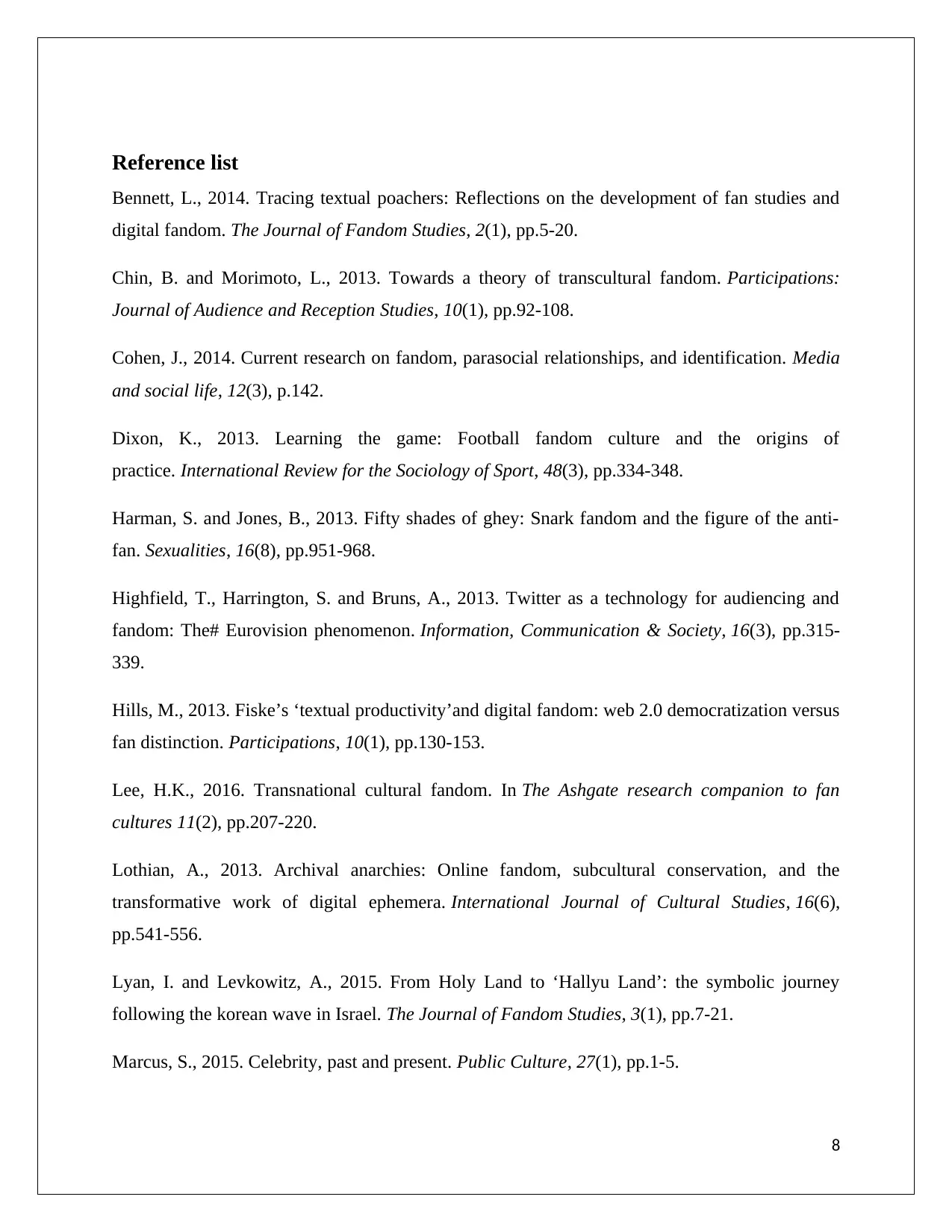
Reference list
Bennett, L., 2014. Tracing textual poachers: Reflections on the development of fan studies and
digital fandom. The Journal of Fandom Studies, 2(1), pp.5-20.
Chin, B. and Morimoto, L., 2013. Towards a theory of transcultural fandom. Participations:
Journal of Audience and Reception Studies, 10(1), pp.92-108.
Cohen, J., 2014. Current research on fandom, parasocial relationships, and identification. Media
and social life, 12(3), p.142.
Dixon, K., 2013. Learning the game: Football fandom culture and the origins of
practice. International Review for the Sociology of Sport, 48(3), pp.334-348.
Harman, S. and Jones, B., 2013. Fifty shades of ghey: Snark fandom and the figure of the anti-
fan. Sexualities, 16(8), pp.951-968.
Highfield, T., Harrington, S. and Bruns, A., 2013. Twitter as a technology for audiencing and
fandom: The# Eurovision phenomenon. Information, Communication & Society, 16(3), pp.315-
339.
Hills, M., 2013. Fiske’s ‘textual productivity’and digital fandom: web 2.0 democratization versus
fan distinction. Participations, 10(1), pp.130-153.
Lee, H.K., 2016. Transnational cultural fandom. In The Ashgate research companion to fan
cultures 11(2), pp.207-220.
Lothian, A., 2013. Archival anarchies: Online fandom, subcultural conservation, and the
transformative work of digital ephemera. International Journal of Cultural Studies, 16(6),
pp.541-556.
Lyan, I. and Levkowitz, A., 2015. From Holy Land to ‘Hallyu Land’: the symbolic journey
following the korean wave in Israel. The Journal of Fandom Studies, 3(1), pp.7-21.
Marcus, S., 2015. Celebrity, past and present. Public Culture, 27(1), pp.1-5.
8
Bennett, L., 2014. Tracing textual poachers: Reflections on the development of fan studies and
digital fandom. The Journal of Fandom Studies, 2(1), pp.5-20.
Chin, B. and Morimoto, L., 2013. Towards a theory of transcultural fandom. Participations:
Journal of Audience and Reception Studies, 10(1), pp.92-108.
Cohen, J., 2014. Current research on fandom, parasocial relationships, and identification. Media
and social life, 12(3), p.142.
Dixon, K., 2013. Learning the game: Football fandom culture and the origins of
practice. International Review for the Sociology of Sport, 48(3), pp.334-348.
Harman, S. and Jones, B., 2013. Fifty shades of ghey: Snark fandom and the figure of the anti-
fan. Sexualities, 16(8), pp.951-968.
Highfield, T., Harrington, S. and Bruns, A., 2013. Twitter as a technology for audiencing and
fandom: The# Eurovision phenomenon. Information, Communication & Society, 16(3), pp.315-
339.
Hills, M., 2013. Fiske’s ‘textual productivity’and digital fandom: web 2.0 democratization versus
fan distinction. Participations, 10(1), pp.130-153.
Lee, H.K., 2016. Transnational cultural fandom. In The Ashgate research companion to fan
cultures 11(2), pp.207-220.
Lothian, A., 2013. Archival anarchies: Online fandom, subcultural conservation, and the
transformative work of digital ephemera. International Journal of Cultural Studies, 16(6),
pp.541-556.
Lyan, I. and Levkowitz, A., 2015. From Holy Land to ‘Hallyu Land’: the symbolic journey
following the korean wave in Israel. The Journal of Fandom Studies, 3(1), pp.7-21.
Marcus, S., 2015. Celebrity, past and present. Public Culture, 27(1), pp.1-5.
8
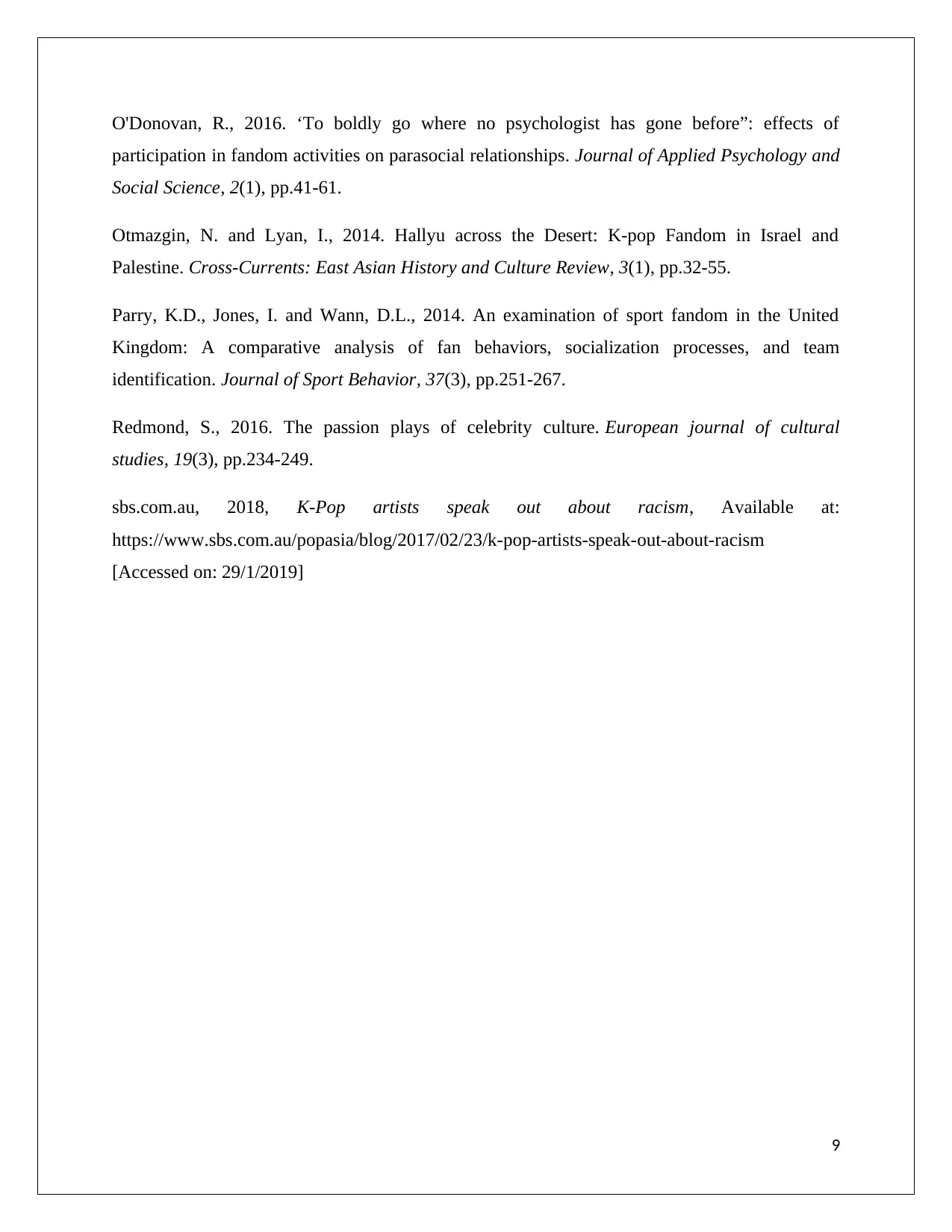
O'Donovan, R., 2016. ‘To boldly go where no psychologist has gone before”: effects of
participation in fandom activities on parasocial relationships. Journal of Applied Psychology and
Social Science, 2(1), pp.41-61.
Otmazgin, N. and Lyan, I., 2014. Hallyu across the Desert: K-pop Fandom in Israel and
Palestine. Cross-Currents: East Asian History and Culture Review, 3(1), pp.32-55.
Parry, K.D., Jones, I. and Wann, D.L., 2014. An examination of sport fandom in the United
Kingdom: A comparative analysis of fan behaviors, socialization processes, and team
identification. Journal of Sport Behavior, 37(3), pp.251-267.
Redmond, S., 2016. The passion plays of celebrity culture. European journal of cultural
studies, 19(3), pp.234-249.
sbs.com.au, 2018, K-Pop artists speak out about racism, Available at:
https://www.sbs.com.au/popasia/blog/2017/02/23/k-pop-artists-speak-out-about-racism
[Accessed on: 29/1/2019]
9
participation in fandom activities on parasocial relationships. Journal of Applied Psychology and
Social Science, 2(1), pp.41-61.
Otmazgin, N. and Lyan, I., 2014. Hallyu across the Desert: K-pop Fandom in Israel and
Palestine. Cross-Currents: East Asian History and Culture Review, 3(1), pp.32-55.
Parry, K.D., Jones, I. and Wann, D.L., 2014. An examination of sport fandom in the United
Kingdom: A comparative analysis of fan behaviors, socialization processes, and team
identification. Journal of Sport Behavior, 37(3), pp.251-267.
Redmond, S., 2016. The passion plays of celebrity culture. European journal of cultural
studies, 19(3), pp.234-249.
sbs.com.au, 2018, K-Pop artists speak out about racism, Available at:
https://www.sbs.com.au/popasia/blog/2017/02/23/k-pop-artists-speak-out-about-racism
[Accessed on: 29/1/2019]
9
⊘ This is a preview!⊘
Do you want full access?
Subscribe today to unlock all pages.

Trusted by 1+ million students worldwide
1 out of 9
Related Documents
Your All-in-One AI-Powered Toolkit for Academic Success.
+13062052269
info@desklib.com
Available 24*7 on WhatsApp / Email
![[object Object]](/_next/static/media/star-bottom.7253800d.svg)
Unlock your academic potential
Copyright © 2020–2026 A2Z Services. All Rights Reserved. Developed and managed by ZUCOL.





